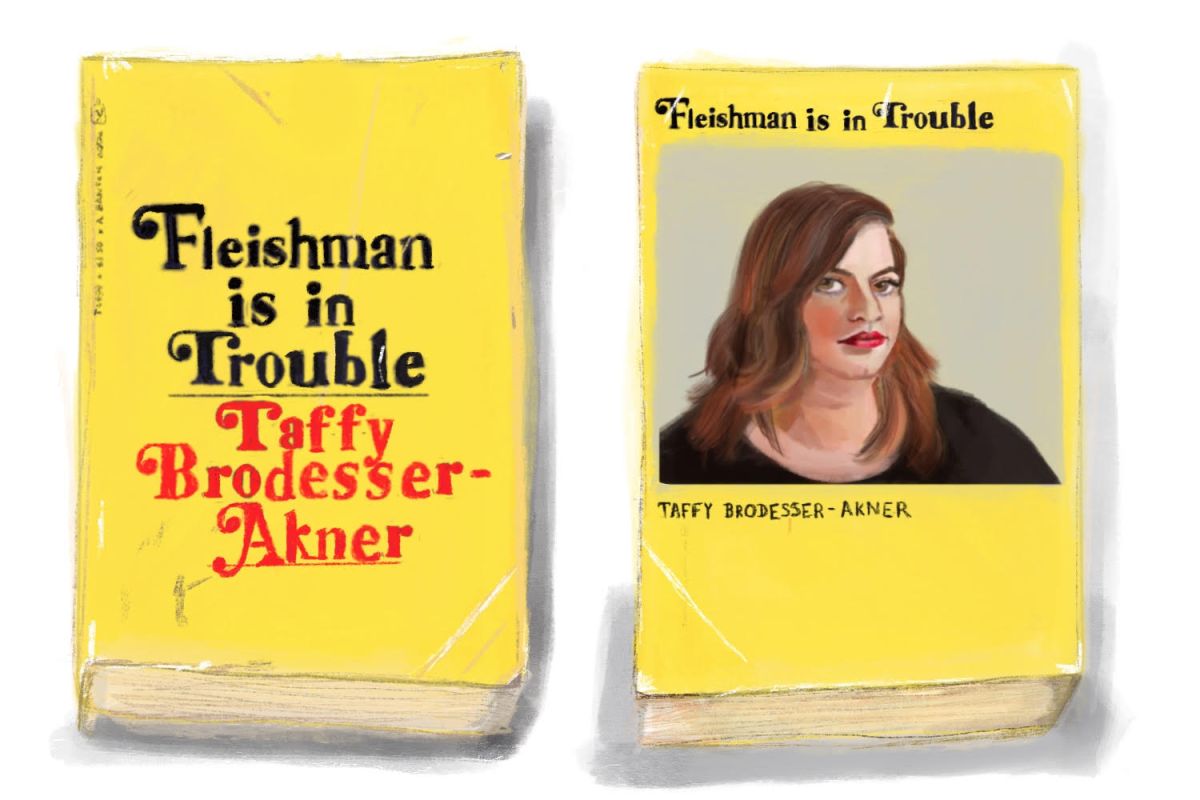Taffy Brodesser-Akner didn’t set out, exactly, to write a pointed response to the male-penned, mid-century, mid-life crisis novel perfected by Philip Roth. Brodesser-Akner, a New York Times’ Magazine journalist who has spent quality time with Gwyneth Paltrow and Tonya Harding to readers’ delight, simply wanted to write the kind of book that she likes to read — and yes, that happens to include Roth. “I never used to read nonfiction growing up,” she tells InsideHook. “I still mostly read fiction.”
It’s impossible to avoid seeing Fleishman is in Trouble, Brodesser-Akner’s debut novel about a divorce among Manhattan social climbers, as entering into direct, loud, dialogue with the male bewilderment of the author’s favorite Roth tomes like American Pastoral and Goodbye, Columbus. Protagonist Toby Fleishman is a menschy doctor who takes care of his kids and patients and happily lets his talent agent wife make the big bucks. Yet he is nonetheless blindsided by female anger, sexuality and feelings, especially when Rachel Fleishman suddenly disappears right before their divorce papers are signed. He’s a Generation X update of the Roth everyman, an update, Toby would ask us to note, who has changed his share of diapers. So why is his wife so angry all the time?
Toby’s literary lineage seeps into everything from Fleishman’s title sounding like something Saul Bellow or John Updike would use, to the book’s self-absorbed secondary characters, chauffeured around the East Side in athleisure, to Brodesser-Akner’s vivid descriptions of Tinder dates, and Toby’s relish therein: “The point was that the parade of women who wanted intercourse with him was steady and strong. He was enjoying this. Did he even need to say that? He was enjoying this,” she writes.
Tempering the prurient glee is a journalist’s unflinching drive to chronicle what she is seeing around her: the ugly lopsidedness of divorce. “When I turned 40, my friends started telling me they were getting divorced,” she says. “They began dating in this world of plenty with these apps, which was extraordinary. But I saw what was out there for the women — and it was not as good as it was for the men.”
This point is a crucial one, because readers will pick up a current in the book that neither Roth or his contemporaries would have been capable of channeling without meanness: pure feminist rage. Long-bottled, barely contained domestic female rage that feels appropriate for the era of #MeToo, rage over the 2016 election, and high profile examinations of women’s anger.
First of all, there’s Libby, Toby’s old pal and the book’s narrator, whose observations puncture the novel’s Toby-centric point-of-view. As a female journalist self-exiled to suburbia, Libby brims over with opinions, interjecting into Toby’s lament about his unfair lot to register complaints about life as a middle-aged woman. “The world diminished a woman the minute she stopped being sexually available to it…” she says, while thundering through a near takeover of the book’s concluding pages.
Libby has relinquished her freedom to be a mom in the suburbs, and the Fleishman marriage breakdown — though she’s ostensibly on Team Toby — causes her to rebel against the patriarchy in her own way, ditching her kids and husband to watch films alone and party with her old friends, as well bring some compassion to the entire picture.
After all, the novel’s offstage villain and Toby’s almost- ex-wife, Rachel, is also a Fleishman and also in trouble. People who disappear do tend to be the latter. Libby’s narration allows Rachel a chance to finally be heard. “Rachel and I, we’d been raised to do what we wanted to do; we’d been successful and we’d shown them,” Libby notes, but “when you did exceed all expectations, nothing around you really shifted. You still had to tiptoe around the fragility of a man…”
In these interludes of unadulterated frustration it affords its female characters, the novel has as much in common with recent trends in feminist literature as it does with Roth. It belongs on a shelf with new novels like Jenny Offil’s Dept, of Speculation, Elisa Albert’s After Birth and Lydia Kieslings’s The Golden State, all of which critique the reality for mothers who happen to have brains by describing, in detail, the diminishment of life after kids, the way self-sacrificial love and mundane tasks can crush a spirit to a pulp. Rachel and Libby would fit in well with all these books’ characters and one wishes they had a chance to sit and chat in a consciousness-raising session. But they’d all be too busy with carpool, anyway.
Akner is not surprised it’s a trending theme. “It makes sense that women would start writing about this,” she says. “How bewildering it is to be told your whole life that you can do whatever you want and then grow up and realize that nobody told the men?” she says, sounding a lot like Libby. “The women I know who were struggling in their marriages have told me that they couldn’t reconcile the person they were supposedly allowed to be with the person they were expected to be in marriage — and they all had liberated husbands who were on board, watching the kids!”
It goes back, Brodesser-Akner says, to that 1950s ideal of suburbia whose dissolution was a favorite subject for Roth. “We’re a couple of generations from the men’s memories of how nice their own mothers and grandmothers seemed holding their Martinis as their dads got home,” she said. “Everybody wants the Martini, but once you equalize things, there’s nobody holding the Martini.”
It’s good to look at art from the past critically, but it’s hard to take something you love and decide that it’s garbage.
Libby’s takedown of the misogynist trap of family life is righteous and angry, but Brodesser-Akner insists she didn’t have an agenda while writing, other than a thorough investigation of the Fleishman breakup. As Libby says towards the end of the book, this is an account meant to show “all the sides of the story, even the ones that hurt to look at directly…”
So neither Team Toby or team Women in Toby’s Life will be fully satisfied. “This wasn’t supposed to be like Exile in Guyville’” Brodesser-Akner says, referring to the Liz Phair record that is a song-by-song rejoinder to the Rolling Stones’ Exile on Main Street.’” No, it’s a Taffy Brodesser-Akner profile of a fictional split, one which, as the best profiles do, allows Toby to be sympathetic, while redeeming Rachel from his view of her as a monster.
Fair, yes, but gentle it is not. The author skewers the world of the Fleishmans — the t-shirts that say “Namastay in Bed” the household staffing problems and wild pursuit of kids’ extracurricular activities, with sharp detail that she scoped out from her own temporary writing studio, courtesy of relatives on the Upper East Side with room to spare. The book’s uber-wealthy mommies are partially inspired by what Brodesser-Akner saw while waiting in line at Sweetgreens on breaks from drafting the book.
The fact that Brodesser-Akner, a hard-working mom of young kids herself, had a temporary room of her own to write her novel makes it hard not to get curious about her search for “balance,” or whether it’s even an appropriate question to ask a woman writer (Lauren Groff thinks not). “This idea of balance—it’s not real,” Brodesser-Akner says. “But the question ‘how do you get it done?’ That I have answers for. I get things done incredibly sloppily, in a half-assed way, and I’m always distracted.” If a commitment tempts her because it strokes her ego, she says, she turns it down: “Does flattery have more value than my children?” she asks herself. Needless to say, none of Brodesser-Akner’s characters are quite enough in control of their egos to make that kind of self-knowing statement, and they probably wouldn’t be as fun to read about if they did.
Given that Fleishman is in Trouble takes a seemingly sympathetic male character and complicates him by slicing in female perspectives, what does its author think of our recent cultural reckoning with the misogyny of our male heroes? It’s hard not to ponder the context of Fleishman Is In Trouble without remembering about Dara Horn’s bitter eulogy to Roth in the pages of the New York Times: “Roth, who achieved true greatness in depicting people like himself, never had the imagination to give these women souls,” she wrote of his female characters.
“I was tortured about it,” Brodesser-Akner says, now referring to the feminist Roth post-mortem. “It’s good to look at art from the past critically, but it’s hard to take something you love and decide that it’s garbage.” It may be that she worked out her ambivalent feelings by writing the book she did—an homage to a well-meaning man whose life spins out of control, but one that refuses to flatten the women in his life—and if so, it’s the best kind of tribute imaginable.
This article was featured in the InsideHook newsletter. Sign up now.























